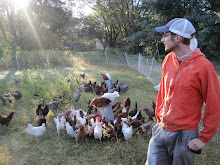I have been preoccupied lately with how to tie the disparate threads the work we do involves - not only food - but the environment, energy, community, health, etc. into a coherent vision for the future.
What triggered the urge to start putting these thoughts down was a presentation we gave to a class at Georgia Southern. The presentation went well - but afterward Arianne and I agreed we did not do a very good job of holding it all together with a unifying theme - that maybe we didn't know ourselves what it was.
I feel that in producing clean, fair, food we have one answer to a question. But what is the question we are trying to answer?
To take a crack at it - "How should I live to truly express my humanity, to lead a fulfilling life, to be good to others who are alive now and to future generations?" One essential answer to this question is clean, fair, food - but it is just one part of a radically different way of thinking about the world. What are the rest of the answers?
Some guiding principles that inform my thinking -
1. To think 100 years ahead - what systems would impress someone from the future?
2. Material Culture + Agri
culture = The World as We Know It
3. What do we truly need?
4. Being CONSCIOUS of our choices. How we spend our time, resources and money determines what kind of world we want. Being aware of how our decisions - how we use energy, what clothes we wear, what food we eat, etc. - effects other people and the environment.
To try and answer my question I would like to start with where we are today in our farm and food culture and contrast it with where I think we should be headed.
Farm/Food Culture of TodayOverall Principles: Bigger, faster, fatter, cheaper. Resources generally wasted. Agriculture as strip-mining. Ecological systems are exploited with a capitalist mindset. Farm land destroyed by suburban expansion.
Farmer - Underpaid, undervalued, marginalized in society.
Energy - Powered by fossil fuels.
Fertilizer/Feed - Unsustainable off-farm inputs whether for conventional or organic systems.
Distribution - Dependent on fossil fuels, long distance travel for foodstuffs.
Community - Most farmers are isolated from customers and markets.
Health - Incentivized by subsidies to grow/manufacture unhealthy food, creating epidemics.
Scale - Multinational corporation controlled food systems.
Government - Regulations that benefit the the powerful, punish small producers and take away citizens rights to eat what they wish.
Farm/Food Culture of the FutureOverall Principles: Food systems to nourish people, conserve resources/energy. People and animal power return to farms, and many small farms flourish instead of a few enormous farms. Communities protect farm land from development.
Farmer - Fairly compensated, valued as a critical member of society - a teacher, scientist community activist, health and green energy guru.
Energy - Farms will grow their own energy - using solar, geothermal, wind, biofuels, etc.
Fertilizer/Feed - A farmers' goal will be to use as few off-farm inputs as possible - by including animals in their production, growing fertility with cover crops, recycling nutrients that are currently buried in landfills, etc. It will be common practice for cities to compost their sewage and return it to the farms who serve them.
Distribution - Local and regional food-sheds will be the norm and the idea of eating a grape from Chile will seem like a bizarre notion from a strange past.
Community - Local communities take back our material culture from corporations - we don't need IKEA, or Wal-Mart. Farms are a focal point for community, everyone know their farmers. There is life and energy in the countryside.
Health - People have stopped buying food that makes them sick - the corporations that sell it are no longer needed - and the vacuum is filled by chemical-free healthy food.
Scale - Regional and local food systems.
Government - People are free to buy whatever food they like from farmers they trust. No subsidies for anyone.
So those are some of my answers to the question! Do you have any any?
Elliott
























